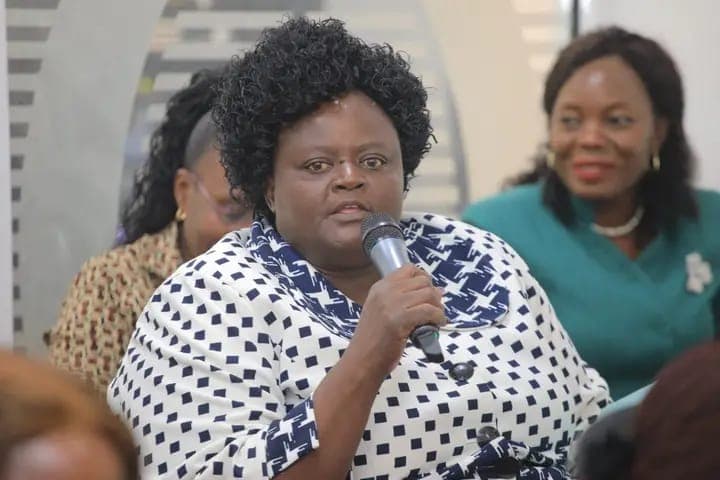We're loading the full news article for you. This includes the article content, images, author information, and related articles.
Homa Bay Woman Representative Joyce Bensuda has declared leaders opposing a broad-based government insincere to the late Raila Odinga, sparking a fierce debate on the future of the Azimio coalition and its pact with the Kenya Kwanza administration.

NAIROBI, KENYA – Homa Bay County Woman Representative Joyce Osogo Bensuda on Wednesday, November 5, 2025, stoked a significant political fire, asserting that leaders within the Azimio la Umoja One Kenya Coalition who oppose the formation of a broad-based government are not sincere to the late Prime Minister Raila Odinga. Her comments, made during a local radio interview, have intensified an already simmering debate about the nature and future of the political cooperation between President William Ruto's Kenya Kwanza Alliance and the ODM party.
"Anyone opposing the broad-based government now, and especially now that Raila is no longer with us, is not being sincere, because this government structure existed even before his passing," Bensuda stated. She argued that the late Mr. Odinga had provided a clear direction for the party, emphasizing inclusivity and the need to listen to the country's youth, particularly following the 2024 anti-finance bill protests. This arrangement, she claims, was Odinga's intended path to address national challenges.
The concept of a broad-based government, which saw several ODM-aligned figures appointed to President Ruto's cabinet, was formalized through a Memorandum of Understanding signed on March 7, 2025. The pact was framed as a necessary step to quell political tensions and tackle national issues like debt and corruption collaboratively. President Ruto himself has championed the arrangement as a means to foster unity and propel the nation forward.
However, the cooperation has created deep divisions within the opposition. Hardliners view the pact as a betrayal of their watchdog role, effectively weakening democratic accountability. In July 2024, the Azimio coalition officially stated it would not participate in a Government of National Unity, calling it a betrayal of the Kenyan people. Wiper Leader Kalonzo Musyoka has consistently maintained this stance, even proposing a transitional government as an alternative. This internal conflict is further highlighted by a September 2025 TIFA Research poll, which found that 64% of Kenyans oppose the broad-based government, a significant increase in opposition since May 2025.
This political maneuvering has significant implications for Kenya. Proponents argue that such handshake deals, like the 2008 Grand Coalition Government and the 2018 truce between Uhuru Kenyatta and Raila Odinga, are crucial for maintaining peace and stability after contentious elections. They contend that an inclusive government can better address national challenges and reduce political polarization.
Conversely, critics warn that these arrangements undermine Kenya's democratic institutions. They argue that co-opting the opposition blurs the lines of accountability, weakens Parliament's oversight function, and leaves citizens without a robust alternative voice to challenge government policies. There are concerns that the current pact is a move by the political elite to preserve their own interests rather than a genuine effort at reform, potentially leading to poor economic governance and a weaker democracy.
Bensuda's challenge to the loyalty of her colleagues comes at a critical time. With the 2027 general election on the horizon, the debate over the broad-based government is intrinsically linked to political positioning. The late Raila Odinga's own statements had been a source of ambiguity; at times he called for unity within the pact, while on other occasions he signaled that ODM would field a presidential candidate in 2027, creating anxiety among his allies serving in government.
The current disagreement has even trickled down to campaign strategies for upcoming by-elections, with confusion over whether to field "broad-based candidates" or stick to individual party branding. ODM Secretary-General Edwin Sifuna has cautioned that using the term "broad-based" could confuse voters and harm the party's chances. As leaders like Bensuda force the issue into the open, the Azimio coalition faces a critical decision: fully commit to the cooperation with Kenya Kwanza or reassert its independence as the official opposition. The outcome will undoubtedly shape the political landscape for years to come, impacting both the stability of the current government and the democratic health of the nation.
Keep the conversation in one place—threads here stay linked to the story and in the forums.
Sign in to start a discussion
Start a conversation about this story and keep it linked here.
Other hot threads
E-sports and Gaming Community in Kenya
Active 9 months ago
The Role of Technology in Modern Agriculture (AgriTech)
Active 9 months ago
Popular Recreational Activities Across Counties
Active 9 months ago
Investing in Youth Sports Development Programs
Active 9 months ago
Key figures and persons of interest featured in this article